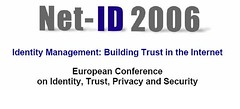I have found at Data Privacy Lab (Carnegie Mellon), all these talks, slides and papers given by Dr. L. Sweenwy
Invited talk: "Privacy Technologies for Large Research Databases" Spectrum Health and Michigan State University, Grand Rapids, MI, September 23, 2005. Given by Lab Director, Latanya Sweeney. (Slides and Abstract)
Invited talk: "Biometrics Alone Won't Do: Developing Holistic Identity Management Solutions" Biometrics Symposium 2005, Arlington, VA, September 19, 2005. Given by Lab Director, Latanya Sweeney. (Slides and Abstract)
Invited talk: "Risk Assessments of PIN Technologies [unique personal identifiers] for Domestic Violence Shelters," National HMIS Conference, St. Louis, Missouri, September 13, 2005. Given by Lab Director, Latanya Sweeney. (Slides and Abstract)
Paper in IEEE Intelligent Systems about privacy and homeland security, entitled: Privacy-Preserving Surveillance using Selective Revelation. This paper describes an approach for sharing data for surveillance purposes while maintaining privacy. July 2005. Authored by Lab Director, Latanya Sweeney. (more)
Testimony: "Privacy Technologies for Homeland Security", Testimony before the Privacy and Integrity Advisory Committee of the Department of Homeland Security (“DHS”), Boston, MA, June 15, 2005. Testimony by Lab Director, Latanya Sweeney. (Testimony and Appendices)
Invited talk: "HIPAA Strategies for De-Identifying Patient Data for Research," American Association of Medical Colleges (AAMC), National Conference, Group on Information Resources, Philadelphia, PA. April 12, 2005. Given by Lab Director, Latanya Sweeney. (Slides and Abstract)
Invited talk: "Privacy Technology in the Face of Information Warfare", Guest Lecture in Course 19-601, Information Warfare, Carnegie Mellon University. Pittsburgh, PA. March 29, 2005. Given by Lab Director, Latanya Sweeney. (Slides and Abstract)
Invited talk: "Privacy Technology: Artificial Intelligence to Save the World", AAAI Spring Symposium. Stanford. Palo Alto, CA. March 23, 2005. Given by Lab Director, Latanya Sweeney. (Slides, References and Abstract).
Invited talk: "Beyond Ickiness is Risk: The Exasperation of Data Privacy Problems by Implanted RFIDs", The Concealed I Conference, University of Ottawa, Ontario Canada. March 4, 2005. Given by Lab Director, Latanya Sweeney. (Slides, References and Abstract).




